|
Cannon Chooses LSU
Billy Cannon started at halfback for powerhouse Istrouma High School in Baton Rouge as a sophomore in 1953. He was a good blocker and pass receiver in addition to being a promising ball carrier.
Cannon exploded onto the state scene as a 6' 175lb junior. He scored Istrouma's first touchdown of the season on an 83y punt return against Warren Easton from New Orleans. He added three more six-pointers on sweeps in the second half. And he "played a great game at safety saving two touchdowns." Later in the season, he scored on a 91y run.
Billy also starred in track in a rare combination of events–the 100y dash and the shot put. His best time in the dash was 9.65 seconds, and he put the shot over 56' to set state records in both events.
Bulked up by weeks of weightlifting in Alvin Roy's pioneering program during the summer, Cannon outdid himself on the gridiron his senior season by scoring an astounding 39 touchdowns for a new Louisiana record. He made all-state again and appeared on all-America high school teams.
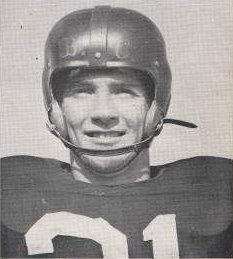 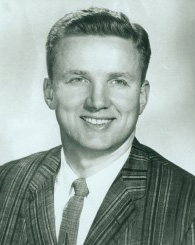 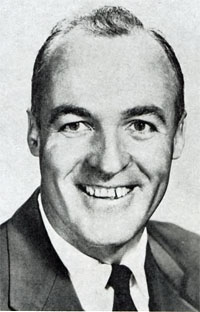 L-R: Billy Cannon at Istrouma, Paul Dietzel, Jim Corbett Paul Dietzel took over the LSU program for the 1955 season after Gaynell Tinsley won only 13 games the three previous years. Knowing that recruiting was the key to rebuilding the Tigers, Dietzel worked hard to stop the exodus of outstanding players to out-of-state schools, starting with the best running back prospect in the country whose defensive prowess was also needed in that era of limited substitution.
On a drab December afternoon, Dietzel sat with Billy and his parents at the family's small kitchen table in their modest North Baton Rouge home. Looking younger than his 31 years, the handsome, well-mannered, and well-spoken young coach laid out his points for returning LSU to the top of the Southeastern Conference. He listed the excellent local players he had already signed, some of whom Cannon had played with and against, including three from archrival Baton Rouge High–Warren Rabb, Don Norwood, and Gus Kinchen. Billy knew several of the recruits only by reputation, especially Johnny Robinson from University High in Baton Rouge and Max Fugler of Ferriday, the only other Louisiana player to make an all-America team. Dietzel concluded by looking Billy in the eye and saying, "This is going to be a first-class operation all the way. I'm hoping you'll want to be a Tiger."
The coach wasn't sure how much headway he was making because Billy had said very little. After thirty minutes, Dietzel left with handshakes at the door. Since Cannon had made no commitment, the young coach was thinking of other ways to reach out to him.
A few days later, two LSU assistant coaches, Carl Maddox and Abner Wimberly, met with Billy at Istrouma, but he still didn't commit.
During the spring semester, Cannon and his high school coach, Fuzzy Brown, met with the new Athletic Director, Jim Corbett, in his office in Tiger Stadium. Fresh off a stint as public relations director for NBC Sports, Corbett spoke to Billy about LSU's academics, stressing the importance of a college degree. As the two exited, Jim shook Billy's hand and said, "Anything you need, my door is always open to you."
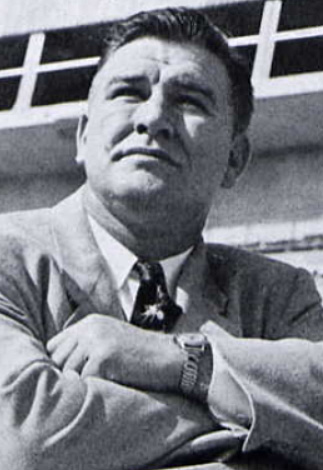 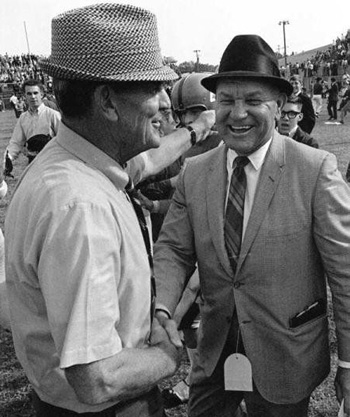 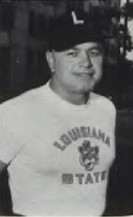 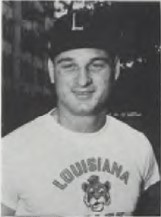 L-R: Bob Woodruff, Bear Bryant and Johnny Vaught, Carl Maddox, Abner Wimberly Naturally, multiple colleges targeted Cannon, including Notre Dame, Rice, Georgia Tech, Oklahoma, and Texas as well as SEC schools.
After running the 100y dash at the state meet, Billy met a man who introduced himself as Dick Jones, a recruiter for Florida. Billy felt comfortable with him immediately and told him that he had seen the Gators play at LSU and believed that his own style of running would fit nicely into their offense
Florida sent Cannon and a teammate airline tickets to Gainesville, where they were wined and dined, given a tour of the campus and stadium, and met with head coach Bob Woodruff. On the trip home, the teammate pestered Billy to commit to Florida before they reached their recruiting quota. While admitting that Florida was his top option, Billy wanted to see what other schools had to offer.
Cannon visited Alabama, whose program had ebbed, leading to the hiring of a new coach for 1955, J. B. Whitworth. Two former Istrouma players were Billy's guides for his visit.
Ole Miss had gone 19-3 and won the SEC title in 1954-55. Cannon dined with the Rebel players at their annual awards banquet. Coach Johnny Vaught impressed Billy when he met with him the next day. "I really liked him," Cannon recalled. "He had as many questions for me as I had for him. He was really interested, very honest, very frank. You could tell why people really loved him."
But would Billy be able to run sprints and throw the shot each spring? Vaught admitted that the Ole Miss track program was not well developed. The school had no full-time coach and no track. Runners and field athletes worked out on grass.
Cannon was disappointed that Texas A&M had not invited him to its campus. Bear Bryant had led his third Aggie team to a 7-2-1 record in 1955, and Billy wanted to be considered as a recruit. What he didn't know was that Dietzel, who had been an assistant under Bryant at Kentucky, had phoned Bryant when he took the LSU job and told him, "I don't really care what you and your staff do recruiting in Texas, Arkansas, or wherever. But in Louisiana, there are some things that you are doing that are not legal. I want you to know that in the future, if any of your coaches break the rules in Louisiana, I'm going to turn you in to the NCAA. Coach, I'm very fond of you and grateful that you treated me so well when I was on your staff, but if you continue to use that private airplane to haul Louisiana athletes and their parents to College Station, I will turn you in."
Billy's dad Harvey had told him, "It's your decision. You don't have to go to LSU if you don't want to." However, Billy suspected that his father hoped he would become a Tiger.
Harvey Cannon played a role in his son finally signing with LSU. In late April, Harvey took Billy to meet his friend Ralph Moran, who ran the Moran Plymouth/Desoto dealership in Baton Rouge. Harvey had bought all his automobiles from Moran.
After some small talk, Moran told Billy, "I want you to go to LSU. I think your family wants you to go to LSU. If you go to LSU and there's anything you need, come to me, and I can help." Billy understood that he was not being offered money but was being promised support.
Moran promised to help Billy find good summer jobs. Used to working since he was a young boy, Billy expected to work between college semesters. But now he envisioned office work instead unloading boxes of frozen chickens as he had the previous summer. "How much will I make?" Billy asked.
"More than you've made before," Moran replied.
Billy decided he had procrastinated long enough over his college choice. "Looks like we've got an LSU deal," he said.
"Good," said Moran. "Don't move. Keep your seats." He then called Coach Dietzel.
References: Billy Cannon: A Long, Long Run, Charles N. deGravelles (2015) Call Me Coach: A Life in College Football, Paul F. Dietzel (2008) |
Tiger Den Archives – I
First LSU Football Game One-Game Sensation Tigers Invade Ebbets Field Dazzling Debut: Tommy Hodson Streak Buster: LSU vs Alabama 1993 Dazzling Debut: Cecil Collins Tiger First: Notre Dame Game Memorable Game: Alabama 1945 Tiger First: UAB Game Tiger Den Archives – II Tiger Den Archives – III Tiger Den Archives – IV Tiger Den Archives – V Tiger Den Archives – VI Tiger Den Archives – VII Tiger Den Archives – VIII Tiger Den Archives – IX Tiger Den Archives – X Tiger Den Archives – XI
Commodore Surprise Tiger Den Archives – XII |